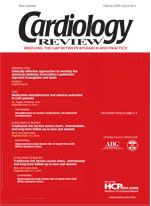Is there a benefit to prescribing statins before PCI?
The study from Italy by Briguori and colleagues (page 18) is a prospective, randomized study of 451 patients scheduled for elective coronary intervention, which again, like studies before this one, showed a benefit to treating elective cases with HMG-CoA reductase inhibitors (statins) at least 3 days before the procedure. This study looked at creatine kinase (CK)-MB and cardiac troponin I and considered a CK-MB level of more than five times greater than the upper limit of normal to be indicative of a myocardial event (non—Q-wave myocardial infarction). Samples were taken before and 6 and 12 hours after the procedure and showed a significant reduction in non–Q-wave infarctions in patients randomly assigned to receive statins at least 3 days before the procedure.
The fact that statistical significance was demonstrated with 451 patients randomly assigned certainly makes the results credulous, but because there was no standardization of which statin was prescribed, at what dose, and the target lipid-level—lowering goal, it is more difficult to extrapolate the data and plan a treatment strategy for clinical use.
As pointed out in the study, the statins seemed to reduce the extent, rather than the incidence, of periprocedural non—Q-wave infarctions. How this is accomplished is speculative, including having some reductive effects locally on the lesion rather than systemically affecting platelet aggregation, anti-inflammatory effects, or even the various aspects of the thrombotic cascade. Several studies (tabulated in the references) have demonstrated similar benefit both before elective procedures, as well as in acute coronary syndromes.
It would seem logical that if you have coronary artery disease you should be taking a statin drug. Thus, any elective coronary intervention patient should already be receiving a statin. This study adds evidence to a growing number of studies that document unanticipated benefits to statin therapy before a coronary intervention.
My only criticism of the study is the lack of standardization of drug and dose, and the lack of specified goals for lipid lowering. The drug type and dose was left to the treating physician. It is thus unclear whether all statins would accomplish the same effect, and what minimal dose or what lowering effect would be required to see any benefit.
I think that the potential benefit of statins before coronary intervention warrants a controlled, randomized study of a particular statin at a dose that results in at least a 30% or greater reduction in total cholesterol and/or low-density lipoprotein cholesterol. Further studies could then be performed to see if larger doses achieve additional gain.
